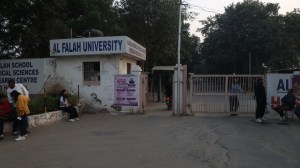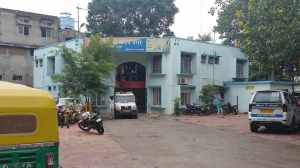Counting the Chickens
8216;8216;I remember the doctor. I think he pulled out one of my teeth,8217;8217; recalls Javed, Manda8217;s grand-nephew, grimacing. ...

In a region that has to live with pictures of its malnourished children being flashed across the country annually, Navapur was a reason to be happy. Not very far from the gloom of malnourishment, Navapur was a prosperous little town, supplying the Surat, Mumbai, Dhulia and Nashik markets with eggs and attracting the tribals from the surrounding hills with culled layer egg-laying chicken. Its estimated turnover: Rs 30 lakh. Per day.
Not anymore. Every hen in the area has been caught and killed. All the eggs smashed and buried. As a precaution, even chicken and mutton shops have been shut down and Navapur has turned vegetarian practically overnight.
8216;8216;It8217;s our reputation that we have lost,8217;8217; says a forlorn Shoaib Pathan, supervisor at Sheesh Farms. 8216;8216;It is going take a long time for us to regain our place in the market. Eggs from Navapur are not going to be easy to sell in the future.8217;8217;
Eggs for Breakfast
AWAY from the ongoing fumigation of poultry farms, the Limbawadi market in Navapur town sticks to its schedule of shutting shop every Wednesday. Peeping out of one of the closed stores is an ageing Ameena Manda. As she unlocks the small wooden door and steps out into the sun, she brushes aside the present gloom and hands you the key to the past8212;when Navapur was just another small agricultural town, where the tribals came down from the hills once a week to shop for essentials and poultry farms were a novelty.
It was way back in 1972, when a young Ahmad Manda, Ameena8217;s husband, got chatting with his dentist. Manda was a regular at American missionary Earl Conrad8217;s little clinic on a hillock above Wakipada, often taking his children and nephews to get their tooth extracted or a filling put in.
Between complicated tooth extractions, the two men chatted endlessly. It was during one of these long conversations that Conrad brought up poultry.
Right across the church, on the banks of what everyone now refers to as the 8216;Wakipada drain8217;, National Poultry Farm started on a small note. Manda faced a huge struggle initially, first in sourcing the chicks, then in getting the farm going and eventually in selling the eggs.
At a time when there was no Sunday ho ya Monday, roz khaye ande popularising eggs, Ahmad Manda dreamt of the day when the price of eggs would shoot up from 10 paisa to Rs 2.
8216;8216;It was one of the most difficult things my father ever did,8217;8217; son Shoaib says. 8216;8216;He would get his chicks from the government in Surat, then raise them and eventually balance baskets of eggs in a crowded train compartment and take it to Gujarat and Mumbai to sell. Each time eggs from Navapur were loaded on a train, rival Gujarat traders would drop prices in their markets and we would have to sell dozens of eggs dirt cheap.8217;8217;
Feather Touch
BUT business caught on slowly gradually and, in 1988, the Mandas opened their own Manosalva Poultry Farm. For 16 years, they flourished, increasing their farm capacity to 20,000 birds. And with them flourished many others: From one farm in 1972, the three-km nagarpalika radius boasted of 58 farms at last count.
Arif Pallawala, owner of the biggest farms in Navapur today, started close on the heels of the Manda family. Switching from the timber business, the Pallawalas invested in the nascent industry, quickly cashing in on the boom.
Perhaps the first sign of the boom going bust came when the Manda family pulled out of the business two years ago to focus on the cloth trade. 8216;8216;It was around that time, bird flu hit Hong Kong,8217;8217; remembers Abdul Samad. 8216;8216;The decision to shut shop was an instinctive reaction that worked out for us. Look at what the flu has done to this town. So many have lost so much they had.8217;8217;
Germ of an Idea
THOUGH the family is no longer in the trade, for Ameena Manda, the loss is personal. 8216;8216;I have seen what it took this town to get the business running. I have seen the sleepless nights people have spent in their coops vaccinating their birds, feeding them, coaxing them to lay more eggs. We may not have our own farm anymore but we are also grieving for our town,8217;8217; she says.
It is not difficult to understand why. Practically every second household in Navapur is linked to the poultry business. While some own farms, others work on them. While some sell eggs, others produce chicken feed.
And then there are the tribals, who eat the culled birds. The Phaseparki tribals haven8217;t made their watery chicken curry for a while now. Instead, they are scrounging along the hillsides looking for food. 8216;8216;We heard about the disease and farm owners also stopped giving us birds,8217;8217; says Sitabai, trying to hold her daughter still as she plaits her hair.
Every man, woman and child in Navapur knows how it all began. 8216;8216;Usually there is chicken mortality during this season but in all our years here, we had never seen something like this,8217;8217; says Javed.
It started with hundreds of birds dying in a coop on a single day. By mid-January, Diamond Poultry Farm had been nearly wiped out, with over 50,000 birds dying in a matter of days. Poultry farm owners, convinced that it was a more virulent form of Ranikhet Disease, looked to Venkateshwara Hatcheries for help. Amid all the confusion of birds continuing to die and varied reports coming in, bird flu was talked about in hushed tones. On February 18, when the official confirmation came, Navapur sank in dismay.
But Venky authorities still trot out their original line: That this is manifestation of a particularly virulent form of Ranikhet Disease, a common poultry illness. 8216;8216;Till we see the report from the Bhopal labs, we are sticking to our stand that this is Ranikhet,8217;8217; says Janak Desai, bio-sentry manager at Venkateshwara Hatcheries.
8216;8216;But now we feel it was a mistake not to have reacted faster,8217;8217; says a farm owner not wishing to be identified. 8216;8216;Maybe some of us should have sent samples to other labs for checking. Maybe we should have gone to the government. Now it is too late and the Rs 40 compensation we are being offered too little.8217;8217;
It took almost a week for a handful of Navapur residents to start covering their mouth with a cloth around poultry farms. For the rest, the entire idea that the virus can make a fatal transition from chicken to man is still far-fetched.
| nbsp; | Practically every second household in Navapur is involved in the poultry business. While some own farms, others work on them. While some sell eggs, others produce chicken feed. The turnover of the industry: Rs 30 lakh. Per day |
8216;8216;Why are you wearing a mask?8217;8217; the young daughter of a poultry farm owner asks in amusement. 8216;8216;We have been living on the farm with our chicken even as they died. Nothing will happen to you. Nothing happened to us.8217;8217;
Fowl Prospects
BUT the recent invasion of mask-wearing experts and journalists into Navapur has bitterly divided the town on the need for a business they all were a part of once.
8216;8216;It is a dirty business,8217;8217; says Vijay Stephen Chaudhary of Karanji Khurd. 8216;8216;I always blame the industry when my toddler falls ill. The air is foul here and such a calamity was waiting to happen. These farms should be moved out of here.8217;8217;
Conspiracy theories, some communal colour and hotels running out of rooms to cater to the influx of people into Navapur have kept a practically jobless town busy.
While human samples are rushed to laboratories and Navapur is under official quarantine for the rest of this month, the residents are waiting for the spotlight to be turned off. As they sit and chat, they promise each other that they 8216;8216;will bring back the lost glory8217;8217; of Navapur.
Navapur8217;s poultry farmers protest about the government compensation
NAVAPUR
AFSAR Sayed is very sorry. He is sorry that he allowed chicks into his life, invested in eggs and spent money on vaccines. He is sorry that he switched from tilling the soil to raising chickens. After watching his birds die for almost two months and then witnessing their mass burial, the owner of Avis Poultry Farm is a broken man.
Owner of one of the smaller poultry farms in the egg belt, Sayed is left with nothing in hand, just a loan of Rs 1.5 lakh to pay back and an uncertain future ahead.
When Sayed started out, around 15 years ago, he was upbeat. The poultry business was booming and cash registers were ringing across Navapur. With a climate congenial to rearing layer egg-laying chickens and a location bang in the middle of the busy western egg trade route, a three km circle around Navapur saw poultry farms multiply from one in the early 8217;70s to 58 farms today.
HAVING made the decision to take to chicken-farming, Sayed put up all his savings and borrowed a bit more to cobble together Rs 15 lakh. That helped him set up a two-shed poultry farm and fill his coops with 8,000 birds. As with all poultry farmers in Navapur, each chick he bought from Pune8217;s Venkateshwara Hatcheries8212;all the birds in the town come from there8212;cost him Rs 15.60. Of the cost of each chick, the hatcheries deduct Rs 1.10 on behalf of the NECC, apparently to be used for poultry farmers8217; benefit.
Next, he started raising them, spending 8216;8216;lakhs on chicken feed8217;8217;. From the day the chickens come home to the 20th week, each bird costs an average Rs 85. Tag on vaccination and medicine costs, averaging Rs 7 per bird per day. All for the day the birds start laying the 8216;8216;profitable, big eggs8217;8217;.
8216;8216;When laying eggs, one bird consumes around 110 gm of bird feed per day,8217;8217; Sayed says. 8216;8216;In fact, our maximum expenditure is on chicken feed and vaccinations.8217;8217;
And then the money starts coming in. Between the 57th and 72nd week, the birds give returns. 8216;8216;Before that, the feed consumption and egg production are at par. The profits come after that,8217;8217; Sayed says, recalling the good days. After the birds stop being profitable on the egg front, they are culled and sold for up to Rs 50 a bird.
At the three collection depots in Navapur, hundreds of eggs are collected, packed, loaded on to trucks and sent out, most heading out to the Surat and Mumbai markets. The rest make their way into neighbouring Nandurbar, Dhulia and Nashik.
Just before bird flu landed and the prices crashed, eggs were selling at the wholesale market for up to Rs 1.50 and in the retail market for Rs 2.
WITH masked government teams re-entering coops in the 58 farms across Navapur to dispose of the scattered feathers and chicken droppings, the last remnants of a business that put Navapur in the heart of the western egg trade will be wiped out.
Buried along with the chicken is the livelihood of Navapur8212;of Sayed and his colleagues and 5,000 workers.
NAVAPUR
LAST week, while the government teams donned their blue suits and masks to fight bird flu in Navapur, a little distance away, tribal teenagers sat in their homes, trying to bury memories of the hundreds of dead birds they had disposed of with their bare hands over the last few weeks.
Much before Navapur hit the headlines for its bird flu epidemic, more than 5,000 farm hands across the town were collecting dead chickens and dumping them into trucks for disposal.
On February 18, when lab test results confirmed that the chickens of Navapur had been hit by the bird flu virus, 16-year-old Neeta Prakash had already spent a workless week at home. After days of disposing of chicken that were dying in the poultry farm she worked in, she was suddenly sent home and told not to come back till further notice. Now she is trying to fathom a future without the only source of income she knows.
FOR the young tribal teenager from Wakipada, being a labourer on a poultry farm was never a choice, it was always a matter of time.
8216;8216;My elder sister Deepika worked at Diamond Farm for eight years before she got married,8217;8217; says Neeta. 8216;8216;I started working after she left, around three years ago.8217;8217;
A student of Adivasi Prathamik Vidyalaya, Neeta stopped going to school once her family made it clear they couldn8217;t afford the fees and needed extra cash around the house. So Neeta swapped her class VII routine for the chicken run.
Before avian influenza landed up at their doorstep, Neeta packed in a busy day. By 8.30 am she was already in the sheds, spotting the few chickens that dropped dead every time the season changed. Once the dead had been disposed of and the cages cleaned, she would feed the clucking flock and run home by noon to get lunch going.
Back at work after two hours, Neeta got ready for her three-hour evening shift. It began with feeding the chickens and then carefully loading tempos with freshly laid eggs. For her day8217;s labour, Neeta would take home Rs 34, much lower than the prescribed minimum wages of Rs 60, but 8216;8216;enough8217;8217; for the toor dal and rice meal of the day.
JUST as Neeta and the 5,000-odd poultry farm hands like her were celebrating the little Diwali bonus package they had got, the chickens started dying. And it was not like anything they had seen before.
8216;8216;Suddenly one morning, there were so many chickens dead. We spent half the day loading them into tractors,8217;8217; Neeta recounts. Diamond Poultry Farms, right across the RTO check-post on the Surat highway, was one of the first farms to report thousands of deaths in a single shed on the same day.
8216;8216;Finally the manager called a butcher and started killing them,8217;8217; says 15-year-old Aruna Dhode Patil, Neeta8217;s co-worker at the farm. 8216;8216;We spent hours loading the killed ones into the vehicles. All we were told by the manager is that the chickens were very sick.8217;8217;
With each passing day, as the condition of the chickens worsened, so did the gloom deepen in the village clusters around each farm. In Wakipada, Khakharphlia, Jamne and Karnji, nobody owns any land. All they have been doing is raising chicken, while a few enterprising men drive trucks in and out of Gujarat.
WEST of Navapur town, in Wakipada, 400 families have suddenly lost a steady source of income. 8216;8216;These people lead a hand-to-mouth existence from the wages these girls at the poultries got,8217;8217; says Vijay Singh, Gujarati teacher at the Uchchal primary school for the last 18 years. 8216;8216;In some households, the men brought in money by loading and driving tempos carrying eggs to Surat and Valsad. Poultry farms were the only places that provided job opportunities here and now they are gone.8217;8217;
While farm owners haggle with the government to increase the compensation amount from Rs 40 per hen, nobody has offered Neeta any hope.
8216;8216;We suffered huge losses, we have loans to repay, we have no money to help them,8217;8217; says Ahmed Pathan categorically. The owner of Pathan Farms used to employ 40 labourers.
| nbsp; | Secretly, the government staff at Ground Zero worry about the flu and share tips to remain bug-free. There8217;s talk of an officer who bathes four times a day to stay 8216;clean8217; |
Flu Frontlines
22-hour days, Tamiflu doses, data-crunching and leading from the front
NAVAPUR
CHIEF Minister Vilasrao Deshmukh doesn8217;t know this story because he floated above Navapur in a chopper and left. His health minister vanished after a day, and the animal husbandry minister was not seen here after speculation that two human cases may have tested positive for avian influenza.
But on ground zero, the sleep-deprived men thrust overnight to the frontline of India8217;s first battle with bird flu popped Tamiflu and worked through the nights.
Nandurbar Zilla Parishad CEO P Anbalagan ends his day at 4 am and is back at work at 6 am. He8217;s a veterinarian trained in Chennai and now he8217;s the man Navapur8217;s administrative staff turns to to understand the virus.
At 1 am last Sunday, hours after the bird flu diagnosis was confirmed, Anbalagan summoned the village gramsevaks and sarpanches to explain the challenges that lay ahead. By 7 am, the men at this meeting had reported back to the panchayat samiti, ready to help in Operation Bird Flu.
8216;8216;Get my mask,8217;8217; Anbalagan requests a staffer as he tells us he8217;s worried about the viral fever he contracted last week on tour. 8216;8216;Meetings at 2 am are routine now,8217;8217; he says.
When Nandurbar collector Jayant Gaikwad heard of speculation that two cases might be positive, he stopped his car on the roadside to think of the monster implications of his job. Until this posting, Gaikwad8217;s stints included number crunching as deputy secretary finance. 8216;8216;Now 99 per cent of my decisions here must be taken without waiting for go-aheads from Mantralaya,8217;8217; says Gaikwad, as he gulps artificial salts to stay alert. He8217;s been sleeping at 3 am and getting up at 5 am.
8216;8216;Closing the highway and banning entry was a decision that the state highway authority should have been part of. We8217;re left to fend for ourselves,8217;8217; he says. 8216;8216;My office is never shut, so I can8217;t sleep knowing my men are awake.8217;8217;
Gaikwad8217;s first headache was organising earth-movers from other districts, to dig the pits and, more recently, getting flame guns from Vadodara to clean-up empty coops.
Alongside, he has been soothing poultry farm-owners and meeting them to get them on his side. 8216;8216;Today you listen to the CEO, tomorrow he8217;ll listen to you,8217;8217; he tells a farm-owner who walks in to complain about the CEO borrowing his farm hands, but quickly leaves smiling.
8216;8216;Just one night this week, I thought I should return home to Nandurbar. But I had barely left Navapur when I felt uncomfortable that my men were still there, fixing the cordoning,8217;8217; says Nandurbar SP Pradip Deshpande. So he turned his vehicle back and didn8217;t think of home again as he joined the police teams and home guards who collapse on tables and dry their clothes on trees because accommodation is unavailable.
At the three-computer control room, groggy staffers punch data on dead birds and destroyed bird feed, all day and night, and complain the room is never swept. 8216;8216;One team8217;s job is to just note TV so we can confirm, deny or act on it,8217;8217; says deputy CEO Lahu Kanade.
Secretly, they worry when they get feverish and share tips to stay virus-free. 8216;8216;I8217;ve been warned to bathe twice,8217;8217; says Gaikwad but he hasn8217;t the time. But there8217;s a story of a top official who quietly disappears home to bathe, four times a day.
- 01
- 02
- 03
- 04
- 05































